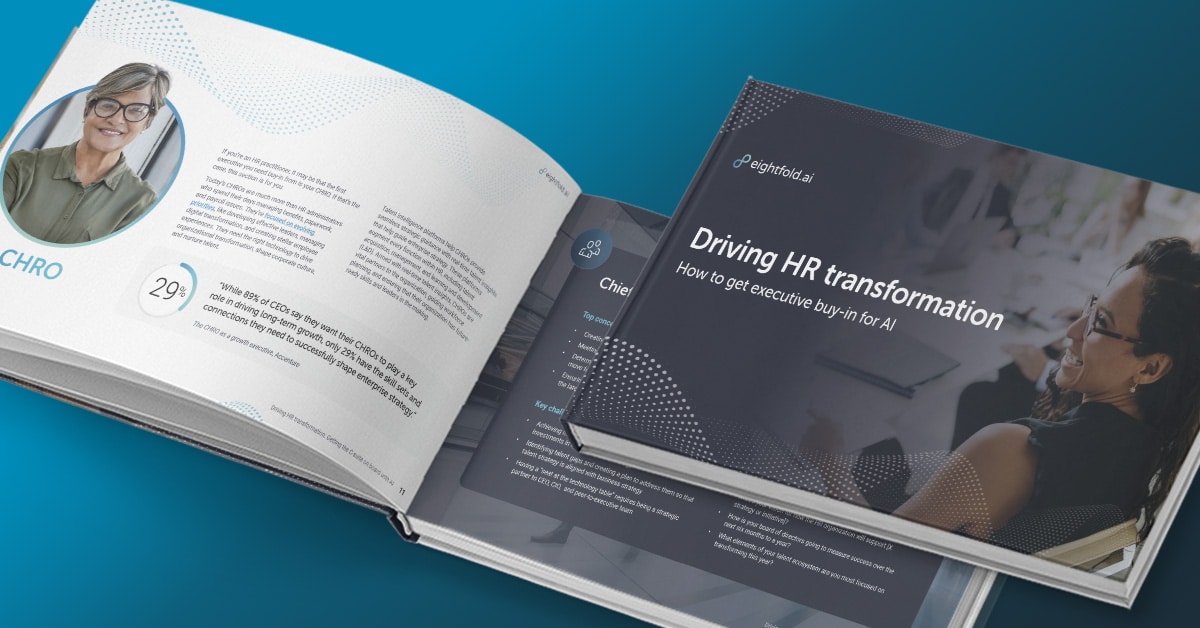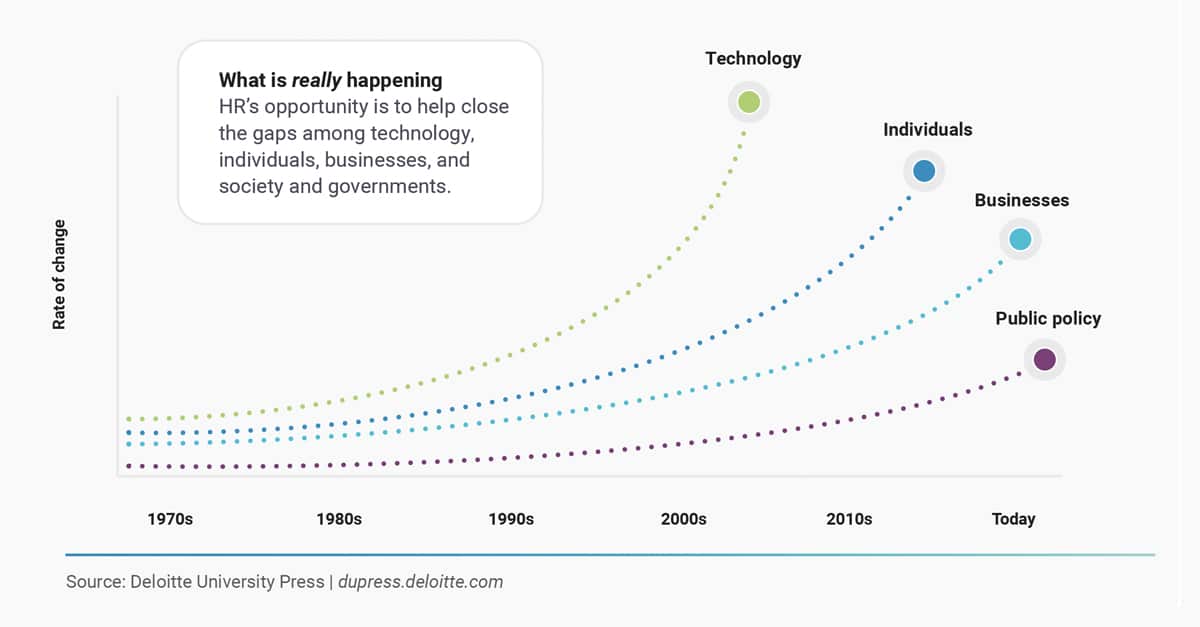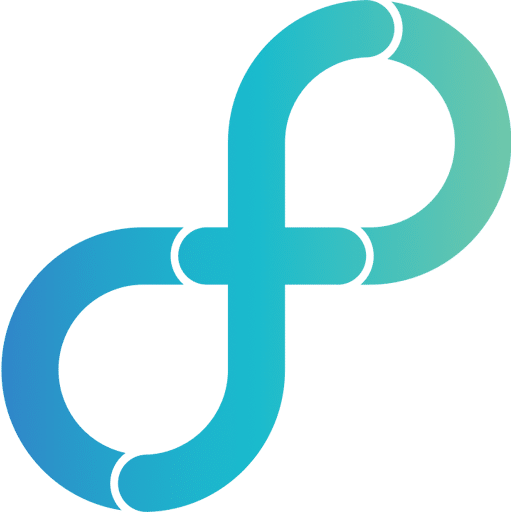“Evolve or die” was the prevailing sentiment from PwC’s 2023 survey of more than 4,400 CEOs. “Transform or perish,” echoed The Josh Bersin Company in its 2023 pacesetters report that analyzed common patterns in top-performing companies.
Unrelenting changes in the economy, technology, society, and the climate have created a state of flux and compulsory adaptation for organizations. One of the biggest drivers of this change — and new opportunities — is AI.
It’s one of the main reasons why we created this ultimate guide to driving HR transformation and getting executive buy-in for AI.
According to our Talent Survey, 92% of HR leaders planned on increasing their use of AI in at least one area of HR in 2023. And it’s not just HR leaders who are eager to take advantage of this technology. According to Deloitte, 94% of business leaders said they believe AI is critical to success.
For HR, the value of AI is clear. Talent intelligence platforms can distill insights and patterns from billions of global data points to help you understand your talent and enhance every stage of the talent life cycle. That includes sourcing, matching, interviewing, retention, internal mobility, mentoring, promotions, and succession planning. These platforms can also streamline time-consuming tasks, like parsing through résumés and scheduling interviews, saving hours each week.
But what about the rest of the organization — and, more specifically, what about the C-suite? Why should they care about talent intelligence for HR, especially with the rise of generative AI and all the other departments itching for new AI capabilities?
Here’s why every executive needs to have talent intelligence top of mind.

Related content: Read the C-suite guide to AI-powered talent intelligence now — Driving HR Transformation: How to get executive buy-in for AI.
Strategic imperative No. 1: Workforce planning
The World Economic Forum’s 2023 Future of Jobs Report predicts that 23% of jobs will change within the next five years, with 44% of workers’ core skills being disrupted. Work is changing lightning fast, and organizations that aren’t prepared will lose any advantage they might have in their industries.
Talent intelligence platforms can help you keep pace and, in fact, lead by instantly understanding what skills and capabilities your workforce possesses, and which skills are rising or falling in your workforce and your competitors’ workforces.
Armed with those insights, you can make data-driven plans to build, buy, or borrow talent — that is, upskill, hire, or contract out work. The right talent strategies, backed by the right intelligence, can help reduce labor costs and align the workforce to overall objectives, including increasing profitability.
Strategic imperative No. 2: Increased retention and reduced costs
As organizations aim to do more with less, bursts in turnover are increasingly expensive — and untenable. The cost of replacing an employee can range from half to two times the employee’s annual salary. As organizations remain hyper-focused on budget, losses in productivity from voluntary turnover and the added strain on remaining employees only compound problems.
To increase retention and employee satisfaction, you can use talent intelligence platforms to surface personalized training and career development opportunities at scale. At a time when talent is more valuable than ever, talent intelligence platforms can help you improve the employee experience through equitable career advancement, internal mobility, and succession planning.
Helping instill new skills that align with your organization’s short- and long-term needs will give employees greater satisfaction and autonomy over their careers while boosting your organization’s productivity and profitability.
Strategic imperative No. 3: Competitive advantage
Organizations can be somewhat sluggish in adopting new technology, but waiting until others in your industry have proven the efficacy of certain technologies is a risky approach.
According to McKinsey, organizations that persisted in innovation during the 2009 financial crisis outperformed their peers by 10%. Over the following years, they continued to outperform their competitors by upward of 30%.

The rate of adopters, individuals, society, businesses, and government agencies, Deloitte University Press.
The world has its eyes on AI, but the truth is that AI has been around for decades. Organizations that lead the way in adopting AI will outperform competitors for years to come. And while this principle is true for AI across functions — including finance, IT, or sales — it’s especially true in HR, where top talent precedes everything else, and having the right skills powers a competitive edge across every team.
What about generative AI?
In HR, generative AI can help you quickly accomplish repetitive or time-consuming tasks with natural language. For example, through a text interface, you can ask a generative AI assistant to compose a job description or surface the best candidates based on specific criteria. The generative AI solution will instantly deliver those outputs.
As another example, you could then use generative AI to compose a personal email to promising candidates in seconds and instantly generate an email to send the hiring manager, using AI-generated candidate summaries.
Workflows that took minutes or hours can be finished in seconds, all with generative AI models that have been trained to reduce bias and increase diversity and equality. The resulting time efficiencies are simply something top-performing organizations can’t afford to miss out on. The good news is that we are already integrating generative AI capabilities into our solutions.
Guide your organization forward with talent intelligence
Eightfold’s Talent Intelligence Platform uses deep-learning AI and one of the world’s largest global talent data sets to provide unrivaled insights into your workforce and the industry at large. Recruit talent efficiently, exceed diversity goals, retain top performers, and upskill and reskill your workforce with a single solution for all your talent needs.
To learn more about why talent intelligence is a must-have for organizations in 2023 and beyond, read our new ebook, Driving HR transformation: How to get executive buy-in for AI.










